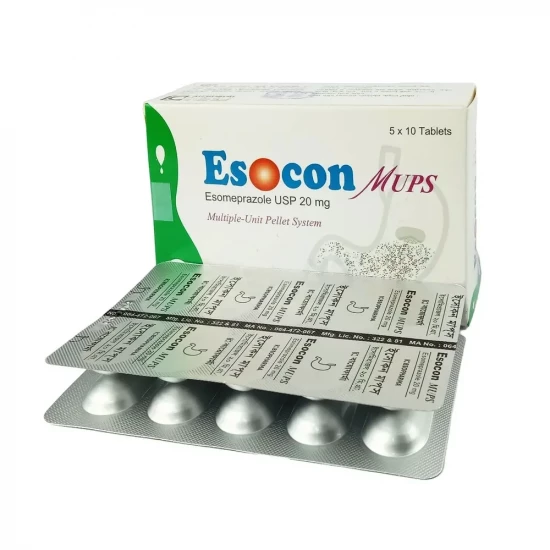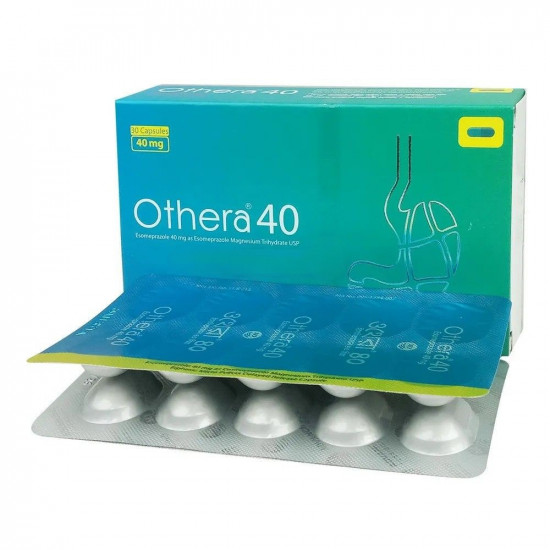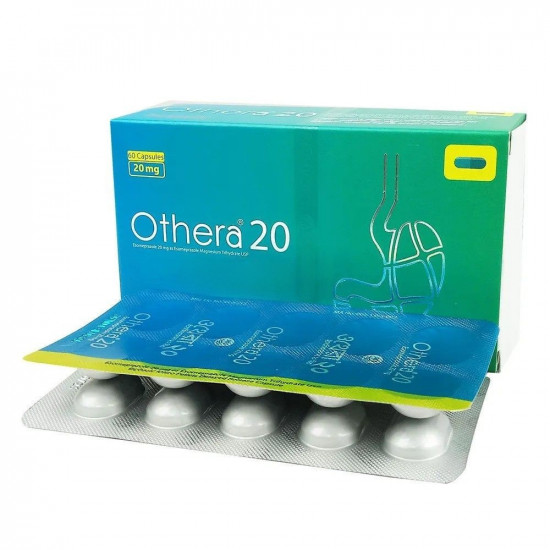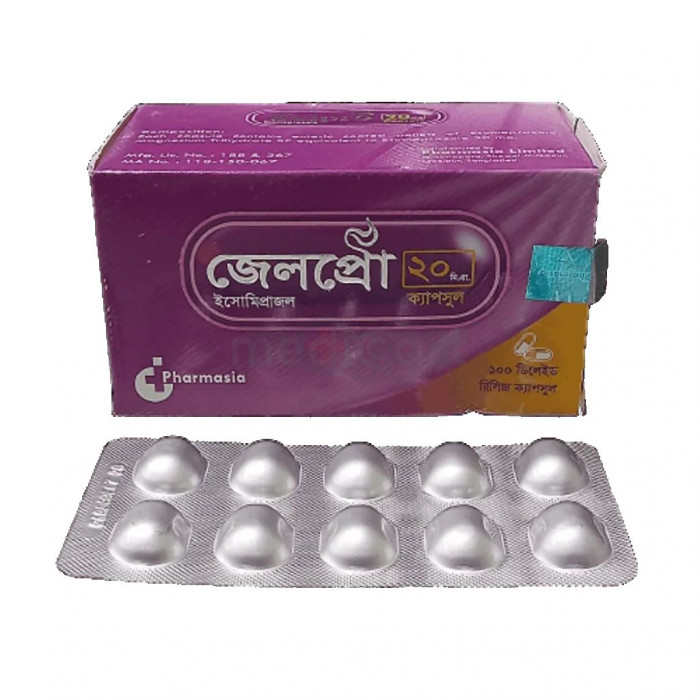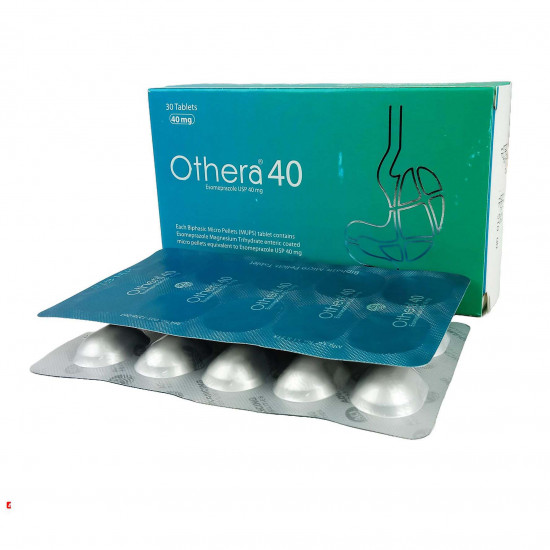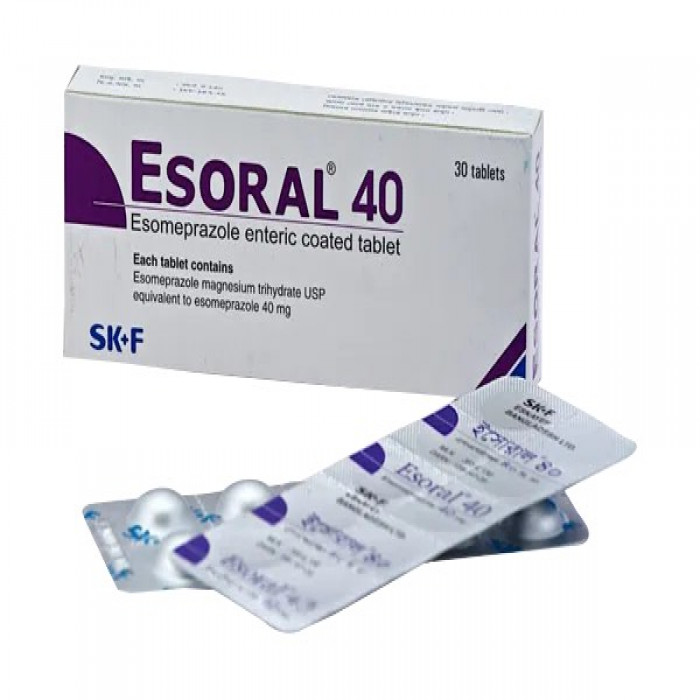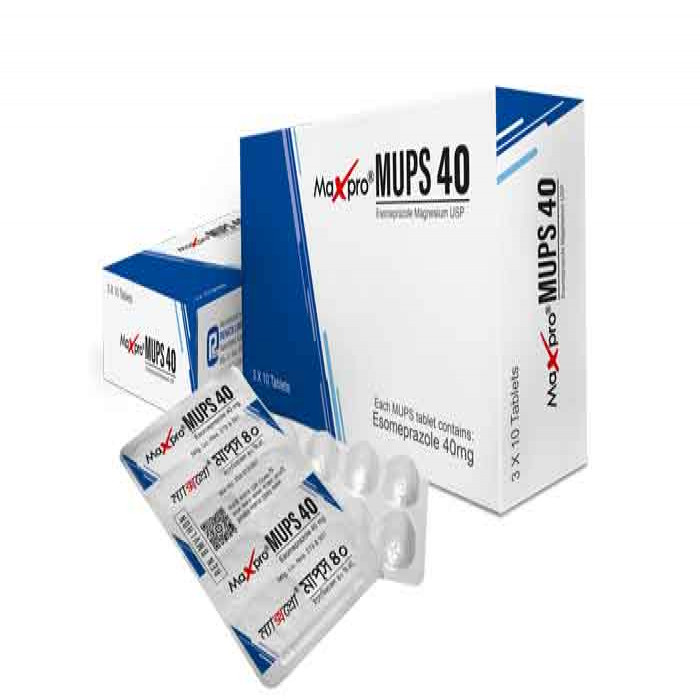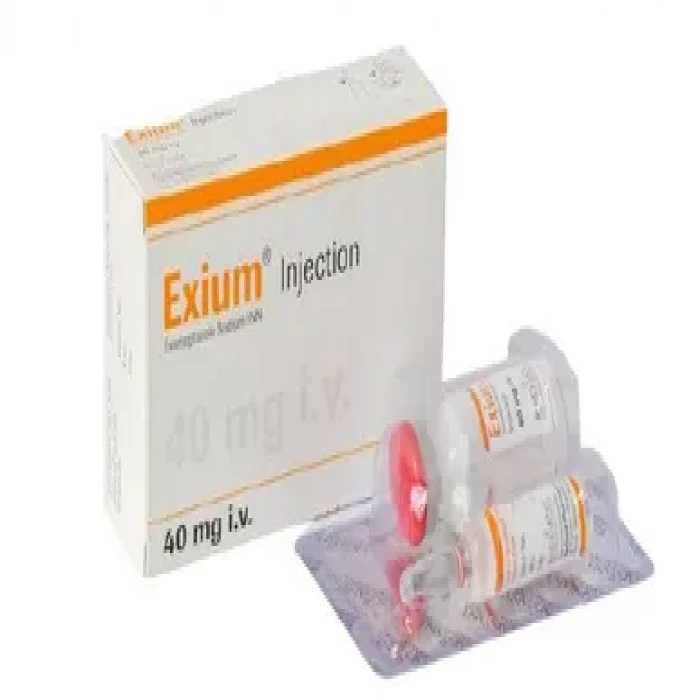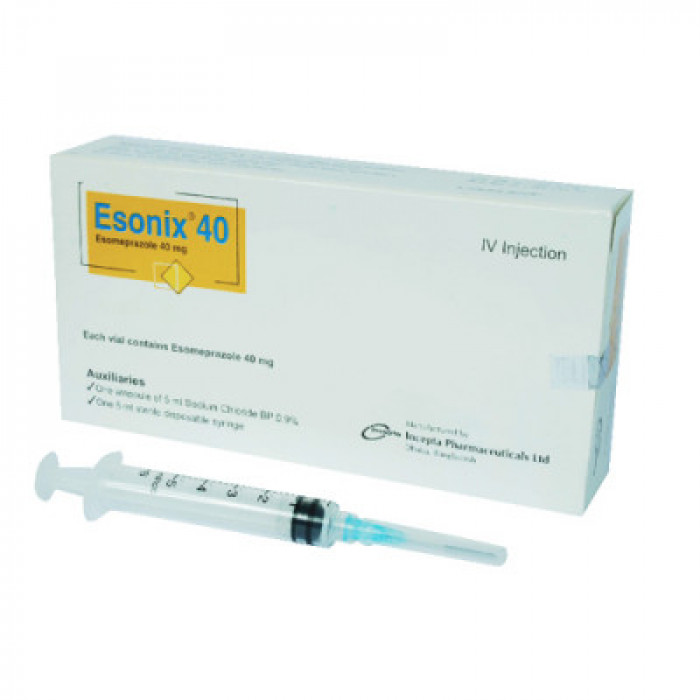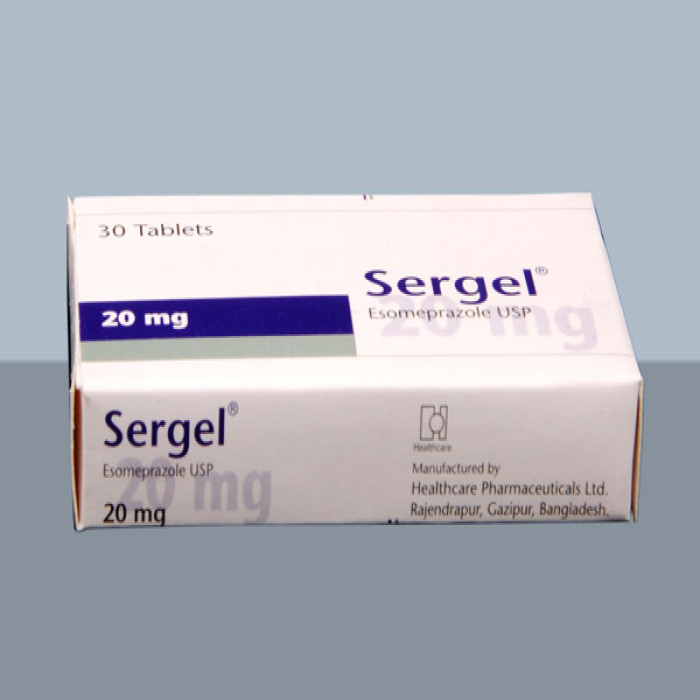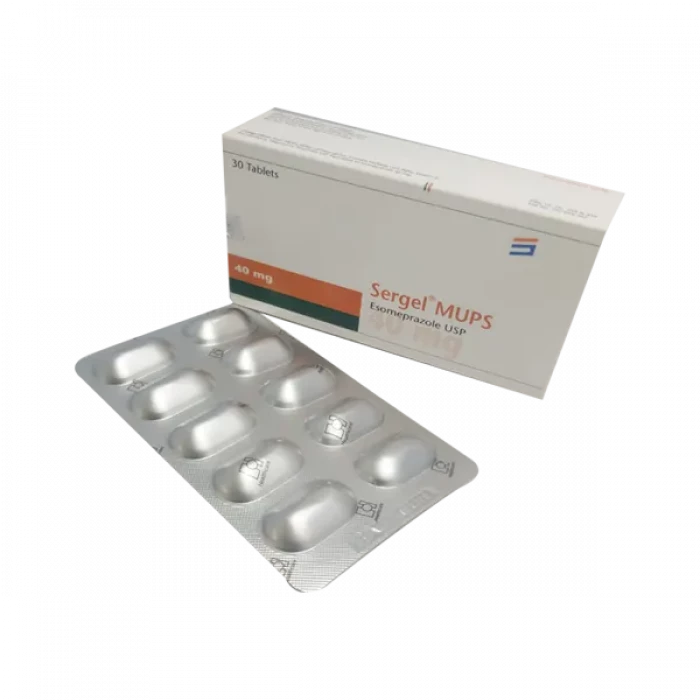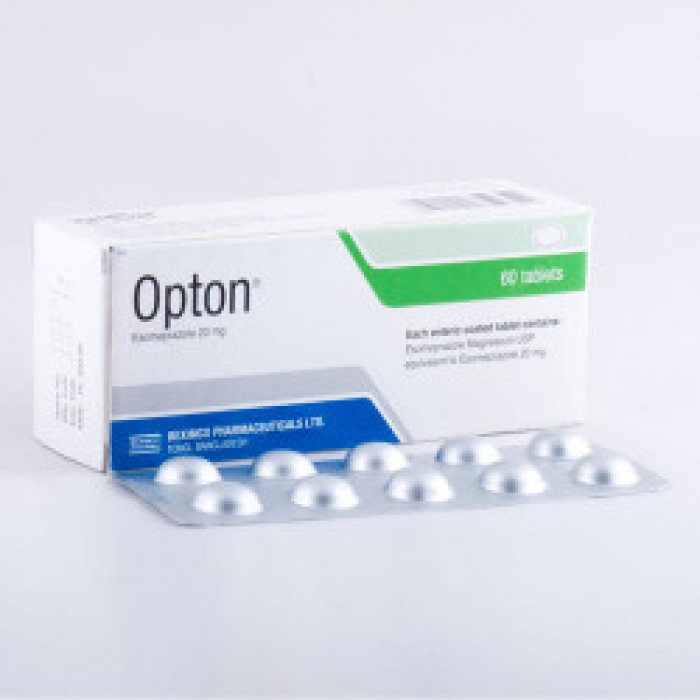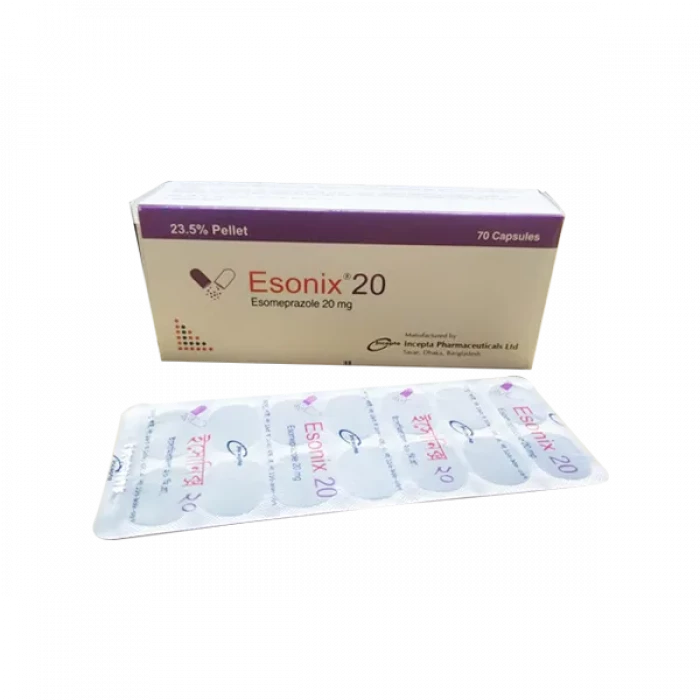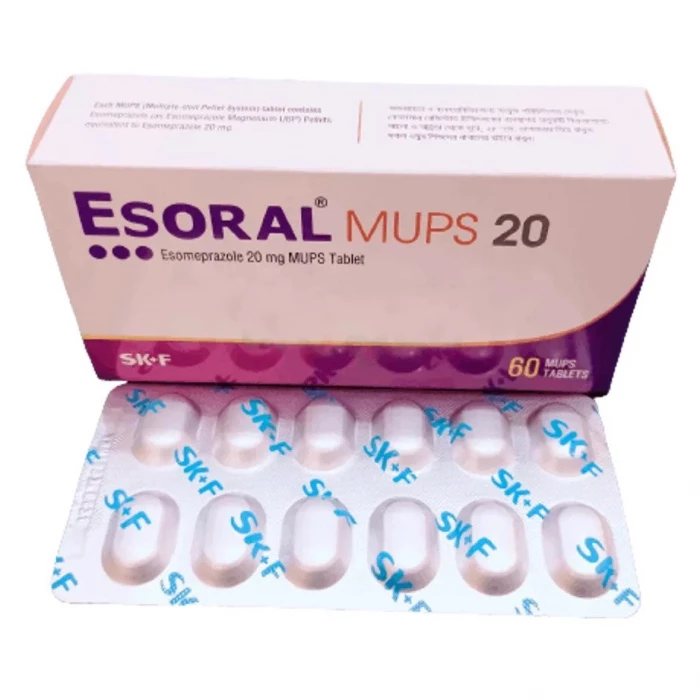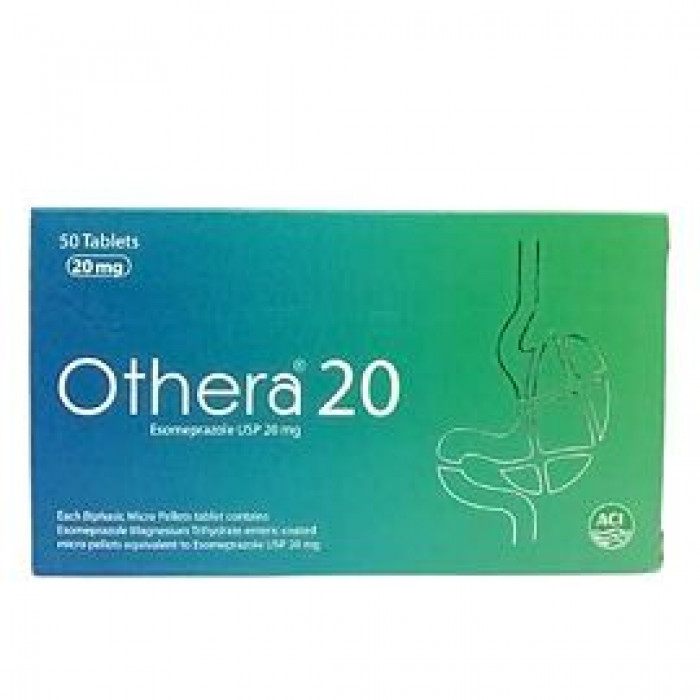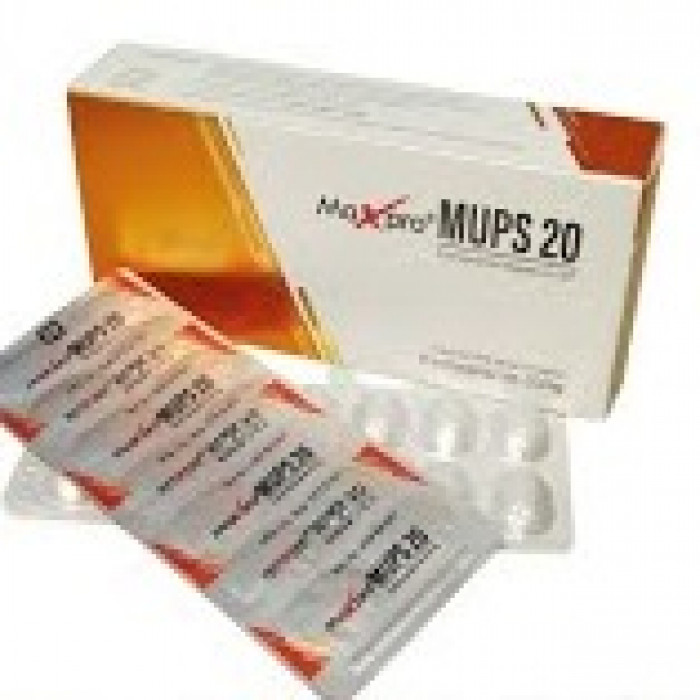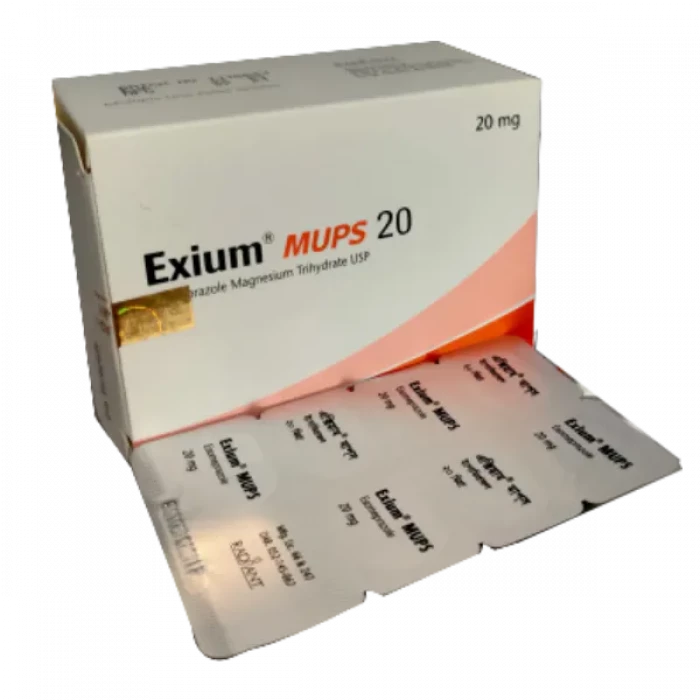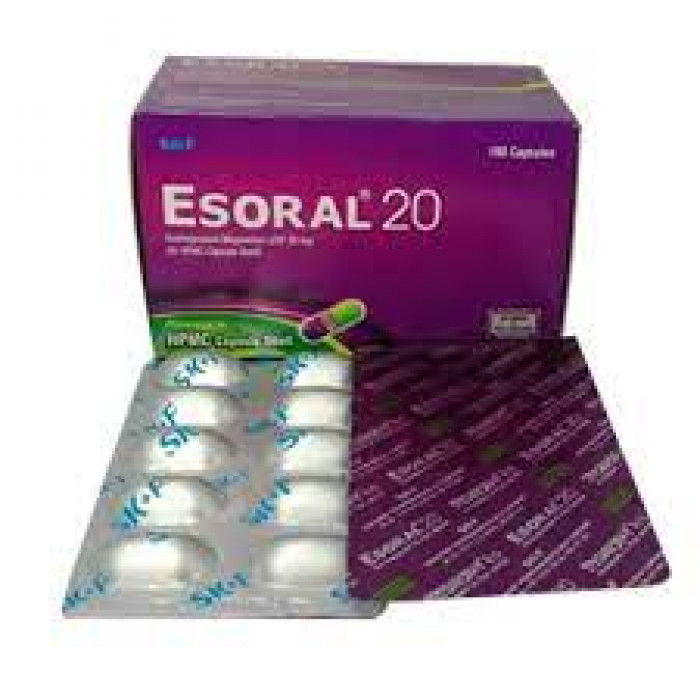
✔ 100% Authentic Product
👁️ Currently Viewing 6149
Esomeprazole Magnesium 20mg Tablet is used to treat stomach and intestinal ulcers, providing relief from heartburn, pain, and chest pain caused by acid reflux disease (Gastroesophageal reflux disease). It is also effective in treating Zollinger-Ellison syndrome, a condition characterized by increased stomach acid production due to a tumor. Additionally, it helps eradicate infections caused by the bacteria H. pylori, which, if untreated, can lead to ulcers.
Discount
Price: ৳ 67
MRP:
৳
70
5%
Off

100% Genuine Products, Guaranteed

Safe & Secure Payments, Always

Fast, Secure & Efficient Delivery

Proper Packaging
 Cash on Delivery - All over Bangladesh
Cash on Delivery - All over Bangladesh Regular Delivery - 12-24 Hours, Dhaka City* Charge Tk.39-59
Regular Delivery - 12-24 Hours, Dhaka City* Charge Tk.39-59 Regular Delivery - 24-48 Hours, Other Cities* Charge Tk.99-110
Regular Delivery - 24-48 Hours, Other Cities* Charge Tk.99-110
 ফ্রি ডেলিভারিঃ - ৯৯৯ টাকা+ অর্ডারে, ঢাকা
শহরে
ফ্রি ডেলিভারিঃ - ৯৯৯ টাকা+ অর্ডারে, ঢাকা
শহরে ফ্রি ডেলিভারিঃ - ২৯৯৯ টাকা+ অর্ডারে, ঢাকার
বাহিরে
ফ্রি ডেলিভারিঃ - ২৯৯৯ টাকা+ অর্ডারে, ঢাকার
বাহিরে
100% Genuine Products, Guaranteed
Safe & Secure Payments, Always
Fast, Secure & Efficient Delivery
Proper Packaging
 Cash on Delivery - All over Bangladesh
Cash on Delivery - All over Bangladesh Regular Delivery - 12-24 Hours, Dhaka City* Charge Tk.39-59
Regular Delivery - 12-24 Hours, Dhaka City* Charge Tk.39-59 Regular Delivery - 24-48 Hours, Other Cities* Charge Tk.99-110
Regular Delivery - 24-48 Hours, Other Cities* Charge Tk.99-110 ফ্রি ডেলিভারিঃ - ৯৯৯ টাকা+ অর্ডারে, ঢাকা
শহরে
ফ্রি ডেলিভারিঃ - ৯৯৯ টাকা+ অর্ডারে, ঢাকা
শহরে ফ্রি ডেলিভারিঃ - ২৯৯৯ টাকা+ অর্ডারে, ঢাকার
বাহিরে
ফ্রি ডেলিভারিঃ - ২৯৯৯ টাকা+ অর্ডারে, ঢাকার
বাহিরে
✅ Description:
- Esoral 20mg Capsule is used to treat conditions caused by excessive stomach acid production, including erosive esophagitis, GERD, Helicobacter pylori infection, and Zollinger-Ellison syndrome. It is also used for short-term treatment of severe erosive esophagitis and symptomatic GERD not responding to standard treatment.
- As a proton pump inhibitor, Esoral 20mg Capsule blocks the proton pump in stomach cells, reducing acid production. Dosage is determined by your doctor based on various factors.
- Patients with chronic liver disease may have difficulty processing the medication. Pregnant and breastfeeding women should consult a doctor before taking it.
- Common side effects include diarrhea, gas, vomiting, headache, nausea, and stomach aches. Severe adverse reactions, though rare, include bone fractures, decreased magnesium levels, seizures, irregular heartbeats, muscle spasms, and weakness.
- Prolonged use may lead to decreased Vitamin B12 absorption and other rare side effects like intestinal inflammation, kidney damage, allergic reactions, weight loss, and fever.
Safety Advices

Alcohol
UNSAFE
Avoid or limit the consumption of alcohol while taking Esoral 20mg Capsule because it might increase the amount of acid in your stomach than normal which can irritate your stomach lining and worsen your symptoms.

Pregnancy
SAFE IF PRESCRIBED
This medicine cannot be used by pregnant women unless necessary. Consult your doctor before taking this medicine.

Breastfeeding
SAFE IF PRESCRIBED
It is not known if Esoral 20mg Capsule passes into breastmilk. Therefore, if you are breastfeeding, consult your doctor to understand the risks and benefits associated with this medicine.

Driving
CAUTION
Do not drive or operate any heavy tools or machines if you experience dizziness and blurred vision after taking Esoral 20mg Capsule. Consult your doctor before taking Esoral 20mg Capsule.

Kidney
CONSULT YOUR DOCTOR
Esoral 20mg Capsule should be used with caution in patients with severe kidney problems. Consult your doctor before taking Esoral 20mg Capsule.

Liver
CONSULT YOUR DOCTOR
Esoral 20mg Capsule should be used with caution in patients with severe liver problems. Consult your doctor before taking Esoral 20mg Capsule.
✔️ Uses of Esoral 20mg Capsule
- Erosive Esophagitis
- Gastroesophageal Reflux Disease
- Helicobacter Pylori Infection
- Zollinger-Ellison Syndrome
- Other Forms Of Ulcers
- Heartburn
- Acidity
✔️ How does Esoral 20mg Capsule work?
Esomeprazole in Esoral 20mg Capsule works by reducing the intake of certain ions in the stomach wall that is necessary for the production of digestive acids in the stomach, thereby lowering acid secretion.
✔️ Side Effects of Esoral 20mg Capsule
- Headache
- Nausea or vomiting
- Excessive gas in the stomach
- Stomach pain
- Skin rash
- Difficulty in breathing
- Swelling of face, lips, eyelids, tongue, hands and feet
- Irregular heartbeat
- Diarrhea
- Decreased appetite
- Dizziness
✔️ Quick Suggestions:
- It is a well-tolerated medicine and provides relief for a long time.
- Avoid excessive intake of carbonated beverages/soft drinks, citrus juices, fried food, and caffeinated beverages like tea and coffee
- Avoid alcohol and smoking.
- Avoid eating late at night or before bedtime.
- Inform your doctor if you get watery diarrhea, fever, or stomach pain that does not go away.
- Long-term use of Esomeprazole can cause weak bones and a deficiency of minerals such as magnesium. Take adequate dietary intake of calcium and magnesium or supplements as prescribed by your doctor.
- Consult your doctor right away if you develop decreased urination, edema (swelling due to fluid retention), lower back pain, nausea, fatigue, and rash or fever. These could be signs of a kidney problem.
✔️ Indication of Esoral 20mg Capsule
- Reflux Esophagitis
Erosive Esophagitis is the swelling of the oesophagus, the tube that carries food from your throat to your stomach. It occurs when excess acid produced in the stomach flows back into your oesophagus, causing irritation and damage. Esoral 20mg Capsule is used to treat erosive esophagitis.
- Gastroesophageal Reflux Disease
Gastroesophageal Reflux Disease (GERD) is a condition that occurs when stomach acid frequently flows back into your food pipe. The symptoms include heartburn, indigestion, difficulty in swallowing, etc. Esoral 20mg Capsule helps in the treatment of GERD by decreasing stomach acid production.
- Helicobacter pylori Infection
Helicobacter Pylori infection is a bacterial infection affecting your stomach and intestine caused by Helicobacter pylori. It is a very common infection that may cause ulcers in your stomach and intestine. Esoral 20mg Capsule is used in combination with antibiotics to treat and prevent Helicobacter Pylori infection.
- Zollinger-Ellison Syndrome
Zollinger-Ellison Syndrome is a condition in which tumours form in the pancreas (an organ located behind the stomach) and duodenum (the first part of the small intestine). These tumours produce a hormone called gastrin which in turn causes excessive stomach acid. Esoral 20mg Capsule is used to reduce the excessive amount of acid produced in the stomach due to tumours.
- Peptic Ulcer
Peptic ulcers are sores that are formed in the lining of your stomach and duodenum (the beginning of the small intestine). It occurs when excess acid produced in the stomach damages the protective layer of your stomach and small intestine. Esoral 20mg Capsule is used to treat ulcers of the stomach and small intestine.
✔️ Pharmacology
Esomeprazole is a proton pump inhibitor that effectively reduces gastric acid secretion by inhibiting the H+/K+-ATPase enzyme in the gastric parietal cell. It is the S-isomer of omeprazole and provides better acid control compared to racemic proton pump inhibitors.
The capsules of esomeprazole contain enteric-coated pellets of esomeprazole magnesium, which enhances its absorption. Peak plasma levels are achieved around 1.5 hours after oral dosing. Increasing the dosage leads to proportionate increases in peak plasma levels and the area under the plasma concentration-time curve (AUC). With repeated once-daily dosing, the systemic bioavailability of esomeprazole is around 90%.
Esomeprazole is highly bound to plasma proteins (97%) and has a constant volume of distribution at a steady state. It undergoes extensive metabolism in the liver, mainly through the CYP2C19 enzyme, with no anti-secretory properties found in its metabolites.
The plasma elimination half-life of esomeprazole is approximately 1-1.5 hours, and less than 1% of the parent drug is eliminated in the urine. About 80% of an oral dose of esomeprazole is excreted in the urine as inactive metabolites, with the remainder detected in the feces as inactive metabolites.
In combination therapy, esomeprazole is administered along with clarithromycin and amoxicillin for antimicrobial purposes. The combination therapy shows some effects on the pharmacokinetics of esomeprazole and its metabolites, but these changes are not considered clinically significant.
✔️ Dosage & Administration of Esoral 20mg Capsule
- Erosive Esophagitis Healing: The recommended dose is 20 mg or 40 mg once daily for 4-8 weeks. Most patients experience healing within this period. If healing does not occur after 4-8 weeks, an additional 4-8 weeks of treatment may be considered. Maintenance of Healing of Erosive Esophagitis: The recommended dose is 20 mg once daily, but clinical studies did not extend beyond 6 months.
- Symptomatic GERD: The recommended dose is 20 mg once daily for 4 weeks. If symptoms persist after 4 weeks, an additional 4 weeks of treatment may be considered.
- Helicobacter Pylori Eradication: In combination therapy, take Esomeprazole 40 mg once daily, Amoxicillin 1000 mg twice daily, and Clarithromycin 500 mg twice daily for 10 days to reduce the risk of Duodenal Ulcer recurrence.
- Zollinger-Ellison Syndrome: The dose ranges from 20 mg to 80 mg once daily, and it should be adjusted individually based on the patient's needs. Treatment should be continued as long as clinically indicated.
- Acid-related Dyspepsia: The recommended dose is 20-40 mg once daily for 2-4 weeks, depending on the individual response.
- Duodenal Ulcer: Take 20 mg once daily for 2-4 weeks.
- Gastric Ulcer: Take 20-40 mg once daily for 4-8 weeks.
✔️ Interaction
Esomeprazole is metabolized in the liver primarily by CYP2C19 and CYP3A4 enzymes. It does not inhibit CYPs 1A2, 2A6, 2C9, 2D6, 2E1, or 3A4, suggesting no significant interactions with drugs processed by these CYP enzymes.
No clinically significant interactions have been observed with phenytoin, warfarin, quinidine, clarithromycin, or amoxicillin when co-administered with esomeprazole.
However, esomeprazole may increase diazepam plasma levels up to 12 hours after treatment.
As esomeprazole inhibits gastric acid secretion, it may affect the absorption of drugs whose bioavailability is influenced by stomach pH, such as ketoconazole, iron salts, and digoxin.
Oral contraceptives, diazepam, phenytoin, and quinidine do not seem to affect the pharmacokinetic profile of esomeprazole.
When esomeprazole is given with clarithromycin and amoxicillin in combination therapy, the plasma levels of esomeprazole and 14-hydroxy clarithromycin rise.
✔️ Contraindications
It is contraindicated in patients with known hypersensitivity to Esomeprazole or to substituted benzimidazoles
✔️ Pregnancy & Lactation
Pregnancy: There are no sufficient and well-controlled studies in pregnant women regarding the use of esomeprazole. Esomeprazole is the S-isomer of omeprazole, and available epidemiologic data do not show an increased risk of major congenital malformations or other adverse pregnancy outcomes with first-trimester omeprazole use. However, in reproduction studies conducted in rats and rabbits, dose-dependent embryo-lethality was observed at omeprazole doses approximately 3.4 to 34 times an oral human dose of 40 mg (based on a body surface area for a 60 kg person).
Lactation: Esomeprazole is the S-isomer of omeprazole, and limited data suggest that omeprazole may be present in human milk. However, there are no clinical data on the effects of esomeprazole on breastfed infants or on milk production. The developmental and health benefits of breastfeeding should be considered along with the mother's clinical need for therapy and any potential adverse effects on the breastfed infant from treatment or the underlying maternal condition.
✔️ Precautions & Warnings
- Pediatric Use: The use of esomeprazole in pediatric patients should be based on the specific indications and dosage recommendations approved for each age group.
- Pregnancy: There are insufficient studies on pregnant women, and the use of esomeprazole during pregnancy should be carefully considered, and the potential benefits weighed against the potential risks. Consultation with a healthcare professional is advised.
- Lactation: Esomeprazole is the S-isomer of omeprazole, and while limited data suggest that omeprazole may be present in human milk, there is a lack of clinical data on the effects of esomeprazole on breastfed infants or milk production. Breastfeeding mothers should consider the developmental and health benefits of breastfeeding along with their clinical need for esomeprazole and any potential adverse effects on the breastfed infant from the medication or the underlying maternal condition.
- Malignancy: Regular use of esomeprazole may increase the risk of developing certain infections, such as community-acquired pneumonia. Patients should be aware of this risk and consult their healthcare provider if they experience any symptoms of infection.
- Hepatic Impairment: For patients with severe liver impairment, a maximum dose of 20 mg of esomeprazole should not be exceeded to avoid potential adverse effects.
✔️
Store in a dry location at a temperature of not more than 30°C. Light and dampness should be avoided. Keep out of children's reach.
⚠️Disclaimer:
At ePharma, we’re committed to providing accurate and accessible health information. However, all content is intended for informational purposes only and should not replace medical advice from a qualified physician. Please consult your healthcare provider for personalized guidance. We aim to support, not substitute, the doctor-patient relationship.




